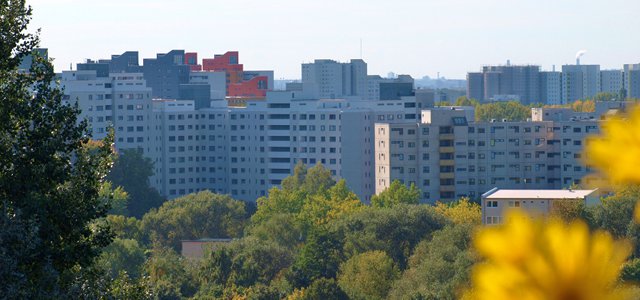Recent developments in Germany have largely been centered on the transformation of electricity production, but to meet its stated targets, Germany needs to double down on efforts in the areas of transportation, heat and energy efficiency, as Boyan Dobrev points out.

With around 40% of energy consumed as heat, retrofitting existing buildings presents a unique opportunity for a reduction in energy consumption. (Photo by Ingo1968, CC BY-SA 3.0)
To achieve its environmental goals, Germany needs to address renewable energy market integration issues, to lay down a concrete phase-out plan for coal generators in light of the watered-down climate levy, and to ensure that the most efficient gas-fired power plants have a role to play in the electricity mix. Reliance on the market mechanism and the merit order for grid access, based on marginal costs of fuel plus carbon price, is less likely to force out coal power plants from the mix. It is unlikely that the marginal cost of coal, even with the reformed ETS, will exceed the price of gas in order to result in a displacement based on market principles alone. Germany needs to specify a clear place for its natural gas generators.
The other areas of energy transformation – energy efficiency and the transportation sector might offer better and less politically controversial options for achieving reductions in energy consumption. Reduced domestic energy consumption and modal switching can result in significant CO2 emissions avoidance.
The German buildings sector accounts for 40% of energy consumption and 21% of CO2 emissions. Building automation and energy monitoring can eliminate waste in space heating, as well as standby electricity consumption. Energy efficient appliances can replace older inefficient models. Passive house and Efficiency House Plus architecture can significantly lower the energy consumption. Germany’s plans for implementing regulations for Efficiency House Plus after 2020 will ensure that all new construction meets strict criteria for energy neutrality. The plans include combining proper siting, insulation, layout, PV, CHP units, heat pumps, ventilation systems and energy efficient appliances to ensure a self-sufficient home that is able to sell back to the grid the excessive amount of energy that it produces or use it to power electric vehicles. With around 40% of energy consumed as heat, retrofitting existing buildings presents a unique opportunity for a reduction in energy consumption. Renovation projects, aiming to improve energy efficiency in existing buildings, can result in up to 90% energy savings. Cogeneration, on the other hand, can provide most of the process heat needed for industrial operations. Distributed generation is often more efficient than centralized – it avoids heat and electricity transmission losses and is tailored for the needs of the respective customer. Germany needs to double its efforts in efficiency upgrades in order to meet its targets for 2020.
Transportation electrification is the other area in which Germany is missing its mark. The plan for 1 million deployed electric vehicles (EV) by 2020 is seriously lagging behind. As of May, 2015, there were only 35,000 EVs on the German roads. The problem with EVs is that they rarely displace a primary car and serve only as an additional, secondary mode of transportation. Another issue is presented by the lack of second-hand market incentives for EVs. Purchase of a new electric or hybrid vehicle is subsidized by the government, but those subsidies do not translate to the used-car market. For the EV sector to be developed, the following solutions, among others, are required: price has to come down; the range should improve; charging infrastructure needs to be developed – at home, on the road, at the workplace and at shopping sites.
The German Energiewende program offers a unique opportunity for a transformation of the energy sector of a developed country with a strong industrial base. While most of the focus has been placed on ways to reform electricity generation, the other sectors – energy efficiency and transportation, also offer significant opportunities for energy savings. The decarbonisation of the German economy needs to be carried out across all sectors in order to ensure efficient use of its renewable energy.
Boyan Dobrev is pursuing a Masters degree in Global Affairs at New York University. His concentration is Energy and the Environment. The MS in Global Affairs program at New York University’s School of Professional Studies has several Global Field Intensives each year. One was to Berlin in May, the culmination of the course on Revolutions in Sustainability.”
Only quibble: “With around 40% of energy consumed as heat, retrofitting existing buildings presents a unique opportunity for a reduction in energy consumption. ”
Sorry, retrofitting is not an opportunity, it is actually the issue. 🙂
Gretchenfrage: Do German tax rules in combination with the current ownerstructure of existing building give enough incentives for retrofitting?